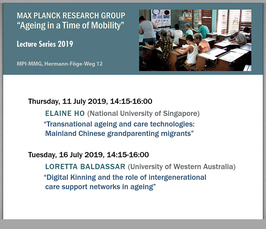"Digital Kinning and the role of intergenerational care support networks in ageing"
Max Planck Research Group “Ageing in a Time of Mobility” Lecture Series 2019
- Datum: 16.07.2019
- Uhrzeit: 14:15 - 16:00
- Vortragende(r): Loretta Baldassar (University of Western Australia)
- Loretta Baldassar is Professor in the Discipline Group of Anthropology and Sociology at The University of Western Australia. She has published extensively on migration, with a particular focus on families and caregiving. Her most recent books include, Transnational Families, Migration and the Circulation of Care (Routledge, 2014). Baldassar is interim Vice President of the International Sociological Association Migration Research Committee and a regional editor for the journal Global Networks. She is co-Chief Investigator on two Australian Research Council funded Discover Projects: Ageing and New Media (with Raelene Wilding, La Trobe University) and Mobile Transitions: Understanding the Effects of Transnational Mobility on Youth Transitions (with Anita Harris, Deakin and Shanthi Robertson, Western Sydney). The Ageing and New Media project re-evaluates the emphasis on proximity in Australian policies of ageing by introducing a focus on mobility, migration and new media. It examines how older people’s support networks are increasingly dispersed due to the greater mobility of their family, friends and care services. The project’s aim is to highlight the current and potential role new media can play in fostering the local, distant & virtual support networks of older Australians. Loretta is part of a research team that collaborates on social inclusion, social innovation, diversity and digital literacy projects, consultancies and evaluations with local government, service providers and community groups.
- Ort: MPI-MMG, Hermann-Föge-Weg 12, Göttingen
- Raum: Conference Room

For more details please contact menster(at)mmg.mpg.de.
This paper is co-authored by Loretta Baldassar (UWA) and Raelene Wilding (Sociology, La Trobe University) and is drawn from their Australian Research Council Project, Ageing and New Media.
Increasing attention is now being paid to the maintenance of families across distance. A strong and growing body of evidence demonstrates that a diverse range of digital technologies are mobilised to circulate care between family members and friends so that they can create and sustain ties of kinship and support. These ties, and the transnational caregiving practices that facilitate them, fluctuate over the live course, increasing in times of ‘care crisis’, including around end of life trajectories. One of the impacts of the reliance on digital media for distant care exchange is that more expansive support networks are involved, as younger family members are co-opted into kin-work and care routines they previously would have been absent from. Today’s polymedia environments create the conditions for synchronous, continuous, multisensory co-presence across distance that challenge the normative and ontological privileging of proximity in care and kinship relations. This paper reports on findings from our project, Ageing and New Media, which examines the role of distant social support networks in the wellbeing of older people in Australia. We propose the notion of ‘digital kinning’ as a way to examine the practices of providing care and support across distance through the use of new media. The concept of kinning (Howell 2013) highlights the processes of becoming kin, not on the basis of biological ties, but on the basis of what is done, performed and exchanged. For older people, these digital kinning practices often require facilitation by others, further emphasising their social relational and intergenerational nature.